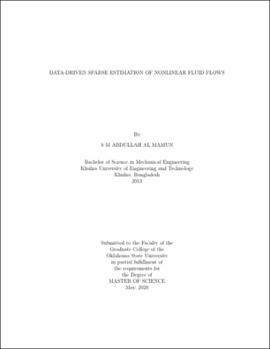| dc.contributor.advisor | Jayaraman, Balaji | |
| dc.contributor.author | Mamun, S. M. Abdullah Al | |
| dc.date.accessioned | 2020-09-09T21:26:42Z | |
| dc.date.available | 2020-09-09T21:26:42Z | |
| dc.date.issued | 2020-05 | |
| dc.identifier.uri | https://hdl.handle.net/11244/325505 | |
| dc.description.abstract | Estimation of full state fluid flow from limited observations is central for many practical applications in physics and engineering science. Fluid flows are manifestations of nonlinear multiscale partial differential equations (PDE) dynamical systems with inherent scale separation. Although the Navier-stokes equations can successfully model fluid flows, there are only limited cases of flows for which it is feasible to acquire exact analytical or numerical solutions. For many real-life fluid flow problems, extremely complex boundary conditions limit accurate modeling and simulations. In such situations, data from experiments or field measurements represents the absolute truth and very few in numbers thus limiting the potential of in-depth analysis. Consequently different data-driven techniques have been critical in active research in recent days. The ability to reconstruct important fluid flows from limited data is critical in applications extending from active flow control to as diverse as cardiac blood flow modeling and climate science. In this work, we investigated both (1) linear estimation method by leveraging data specific proper orthogonal decomposition (POD) technique, and (2) nonlinear estimation method on the ground of machine learning using deep neural network (DNN) algorithm. Given that sparse reconstruction is an inherently ill-posed problem, to generate well-posedness our linear sparse estimation (LSE) approach encodes the physics into the underlying sparse basis obtained from POD. On the other hand, for nonlinear sparse estimation (NLSE) we tried to find an optimal neural network model working over different ranges of hyperparameters through a systematic implementation. Our NLSE approach learns an end-to-end mapping between the sensor measurements and the high dimensional fluid flow field. We demonstrate the performance of both approaches for low and high dimensional examples in fluid mechanics. We also assess the interplay between sensor quantity and their placements introducing some greedy-smart sensor placement methods such as Discrete Empirical Interpolation Method (DEIM), QR-pivoting, etc. The LSE method needs the knowledge of low dimensional sparse basis to be known a priori, whereas the NLSE requires no prior knowledge to be available. The estimation algorithm of NLSE is purely data-driven with a comparable level of performance. To make our neural network optimization more robust we implemented Latin Hypercube Sampling (LHS) algorithm to ensure that each hyperparameter sample has all portions of its distribution in the considered range of analysis instead of sampling them randomly. Throughout the thesis, we demonstrate a comparison of each approach taken into consideration to conclude on their performances. A special focus has been placed to learn high dimensional multiscale system such as the near-wall turbulent channel flow using the NLSE method to evaluate the advantages and limitations of the nonlinear approach in comparison to the traditional linear estimation. | |
| dc.format | application/pdf | |
| dc.language | en_US | |
| dc.rights | Copyright is held by the author who has granted the Oklahoma State University Library the non-exclusive right to share this material in its institutional repository. Contact Digital Library Services at lib-dls@okstate.edu or 405-744-9161 for the permission policy on the use, reproduction or distribution of this material. | |
| dc.title | Data-driven sparse estimation of nonlinear fluid flows | |
| dc.contributor.committeeMember | Bai, He | |
| dc.contributor.committeeMember | Kamalapurkar, Rushikesh | |
| osu.filename | Mamun_okstate_0664M_16710.pdf | |
| osu.accesstype | Open Access | |
| dc.type.genre | Thesis | |
| dc.type.material | Text | |
| dc.subject.keywords | deep neural network | |
| dc.subject.keywords | latin hypercube sampling | |
| dc.subject.keywords | linear estimation | |
| dc.subject.keywords | nonlinear estimation | |
| dc.subject.keywords | pod | |
| dc.subject.keywords | sparse estimation | |
| thesis.degree.discipline | Mechanical and Aerospace Engineering | |
| thesis.degree.grantor | Oklahoma State University | |
